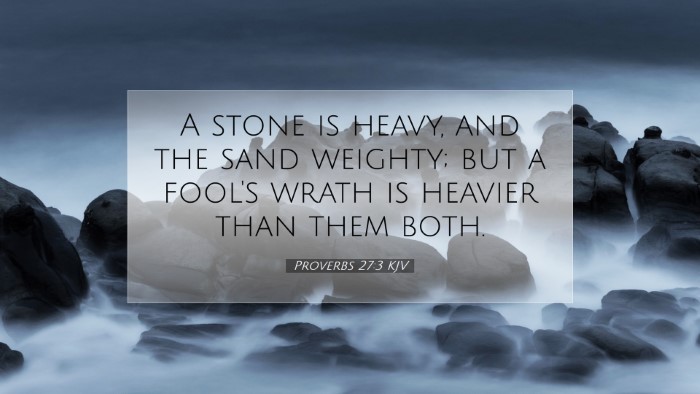Commentary on Proverbs 27:3
Proverbs 27:3 states:
A stone is heavy, and the sand weighty; but a fool's wrath is heavier than them both.
Introduction
This verse presents a thought-provoking contrast between tangible weights and the weightiness of a fool's wrath. It emphasizes the emotional and spiritual burdens that arise from foolishness and anger, encouraging reflection on the importance of wisdom in managing one's emotions.
Exploration of Themes
1. The Nature of Anger
Anger, particularly that which is rooted in folly, can carry substantial weight. Albert Barnes notes that while physical objects like stones and sand are indeed heavy, the emotional turmoil caused by anger—especially foolish anger—can leave a far deeper impact on individuals and relationships.
Impact on Relationships
Matthew Henry expounds on how foolish anger not only burdens the individual who harbors it but also affects their interactions with others. Anger can lead to broken relationships and lasting divisions, akin to carrying a heavy load that one cannot easily set down.
2. The Fool's Wrath
In examining the "fool's wrath," Adam Clarke underscores the impulsiveness and irrationality inherent in foolish anger. A fool lacks the wisdom to respond appropriately to life's provocations, often resulting in chaotic and destructive behavior.
-
Description of a Fool:
A fool is characterized by a lack of discernment and sensitivity. Their wrath, compared to heavy weights, suggests it brings about more severe consequences than one might anticipate from mere physical burdens.
-
Consequences of Foolishness:
The ramifications of folly extend beyond the individual, spilling over into the lives of others and potentially damaging communities.
The Comparisons: Stone vs. Fool's Wrath
The deliberate comparison serves to underscore the weightiness of emotions. Stones and sand are commonplace and can be measured; however, the wrath of a fool goes beyond measurable burdens. It represents unchecked emotions leading to adverse outcomes.
1. Measurement of Emotional Burdens
The author invites the audience to ponder the impact of emotions. How does the wrath of a fool affect inner peace and social harmony? It suggests that wisdom is key in lightening personal burdens.
The Call to Wisdom
The juxtaposition urges individuals to pursue wisdom actively. Rather than succumbing to the futile nature of foolish anger, applying wisdom leads to lighter emotional burdens and healthier relationships.
1. Recognizing the Weight of Our Actions
Recognizing how one's actions can weigh on others is a call to greater accountability. It emphasizes a righteous life grounded in wisdom can cultivate peace rather than discord.
2. The Role of Self-Control
Self-control is paramount to counteracting foolish anger. It enables individuals to respond to grievances without resorting to rage, thereby avoiding the weightiness synonymous with a fool’s wrath.
Conclusion
Proverbs 27:3 serves as a poignant reminder of the implications of foolishness and anger. In the quest for wisdom, we are beckoned to consider not only the burdens of this life—both physical and emotional—but also our responses to them. To engage with this verse is to embark on a journey towards greater wisdom, leading to lighter hearts and richer relationships.


